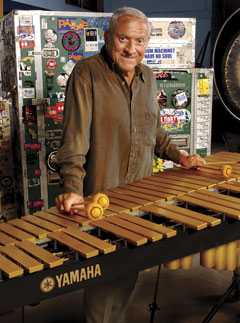


You may not have heard of Emil Richards, but you've definitely heard him. A lot.
Wth 1,800 film score to his scredit, Richards, 71, is in all likelihood the most recorded mallet player in history. He also boasts session credits with 750 recording artists, from Frank Sinatra and Judy Garland to George Harrison and Frank Zappa.
"I've been playing since I was six," says Richards. "My brother wanted an accordion, and my dad made the mistake of taking me to the music store with him. So while my dad was signing the papers for the accordion, I said, 'I want something, too!' And I pointed to the first thing I saw: a xylophone."
I'm constantly searching for new and unique ways for vibraphone to express itself.
Young Emil studied classical percussion while also absorbing the influences of Lionel Hampton and Red Norvo, the leading vibraphonists of the day. Before long, he was gigging with such jazz greats as George Shearing, Charles Mingus and Chris Connor.
After settling in L.A. in 1959, Richards began working in film and never stopped. He also went on to collaborate with the late Harry Partch, an iconoclast composer who built his own percussion instruments. "Harry used marimbas, bass marimbas, diamondshape marimbas," remembers Emil. "But he divided the octave into 43 tones instead of just 12. So in order to communicate with musicians, he wrote the parts out as if they were in western notation. You had to get used to seeing one thing in the music and hearing something completely different when you played."

But Richards' principal axe is the vibraphone. In addition to his mastery of the traditional mallet vocabulary, he has worked relentlessly to expand the instrument's palette, via such techniques as bowing the keys for an eerie, sustained sound or creating artificial crescendos by manipuLating the instrument's propellers. "I'm constantly searching for new and unique ways for the vibraphone to express itself," he says.
Richards is a longtime endorser of Yamaha vibes. "I started out using their first three-octave model, then graduated to the three-and-a-half-octave model, and now I'm playing the four-octave instrument," he says. Richards has also consulted extensively with the company, suggesting various modifications and refinements. "For example," he says, "I suggested situating the motor to make it easier to bow the instrument. So we developed a motor that could swing outward, giving you access to the bars directly above the motor. Another example was the touch-sensitive on/off switch. Composers often specify vibrato for one part of a piece, and none for another. But if you have to look down and fumble for the switch, it takes your eyes off the music and the conductor. This way, you just touch the motor anywhere and it turns on or off."
Emil says he always gets excited about working on new concepts for the vibraphone with the design staff at Yamaha. "Yamaha does a good job of speaking to many of their artists about some of the pros and cons of the instrument, asking what professional players want to see, while keeping mind what is good for the beginning student, as well as more seasoned percussionists. Some of the changes may be minor and some may be major. we'll just have to wait and see what they come up with next."
One side effect of Richards' years in hollywood is his enduring interest in the percussion instruments of the world. "I would sometimes get soundtracks that included sounds indigenous to wherever a film is set, like Vietnam, for example." says Richards. "That started it all. But because I loved all facets of percussion, I became interested in percussion instruments from around the world." Richards has visited Cuba, Bali, India, Tibet, Nepal, Europe, the Middle East, and South America, listening to and collecting instruments. "And I've heard great talent everywhere I've gone," he adds.
It's a measure of Richards' stature as the mallet man that composers, seeking to evoke an exotic flavor, routinely consult him before they even start their scores. "I'll tell the composer about the relevant instrument," says Richards. "I'll explain how they're played, what they sound like, what the typical rhythms and melodies are, and so forth. Sometimes I even loan the composer recordings of music from the area."
You can survey Emil Richards' astonishing list of credits at www.EmilRichards.com, where you can also obtain details on his instructional materials and recent recordings, including Luntana, a fiery Afro-Cuban set featuring a stellar crew of Latin percussionists, and The Wonderful World of Percussion, on which Richards displays his skills on most of his vast instrument collection, with as many as 40 overdubs per track.
























